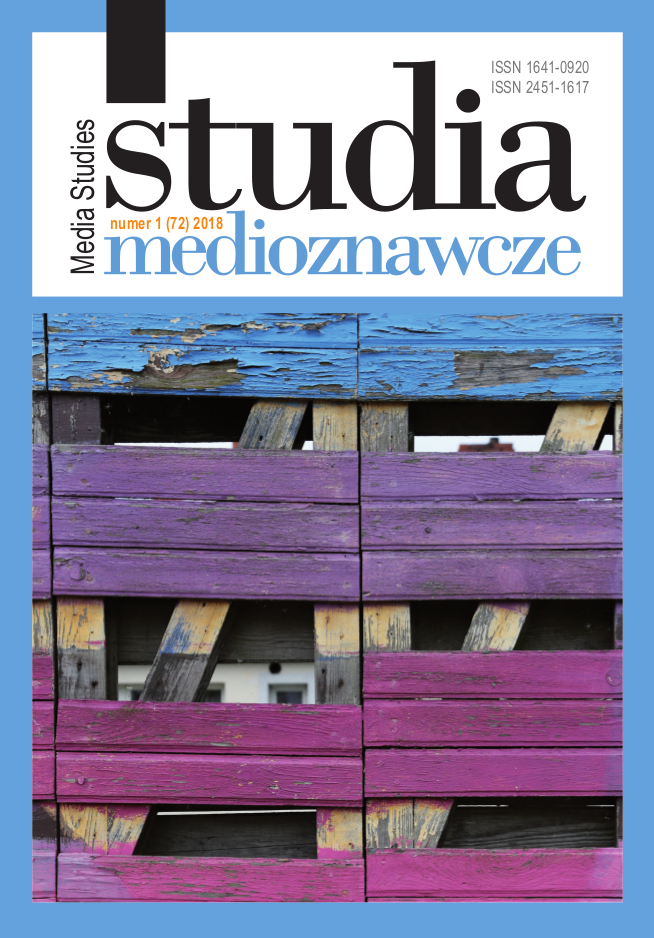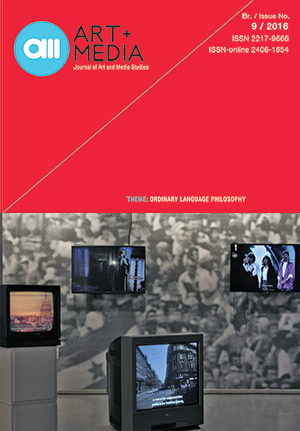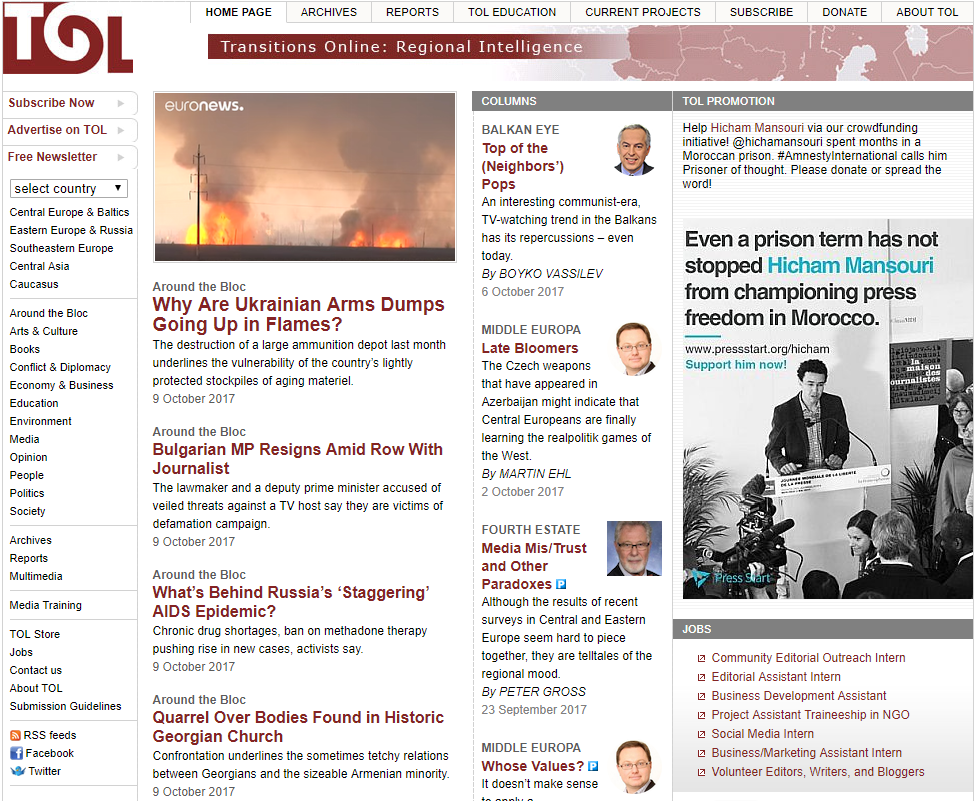
Transitions Online_Balkan Eye-Top of the (Neighbors’) Pops
An interesting communist-era, TV-watching trend in the Balkans has its repercussions – even today.
More...We kindly inform you that, as long as the subject affiliation of our 300.000+ articles is in progress, you might get unsufficient or no results on your third level or second level search. In this case, please broaden your search criteria.

An interesting communist-era, TV-watching trend in the Balkans has its repercussions – even today.
More...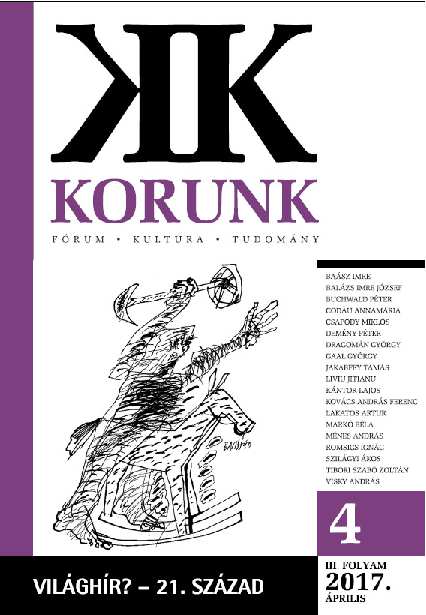

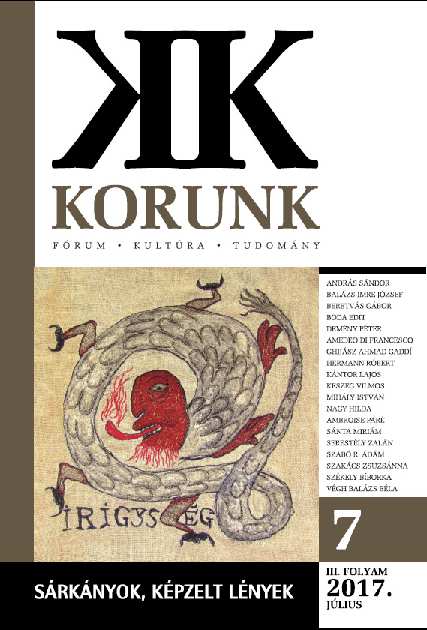
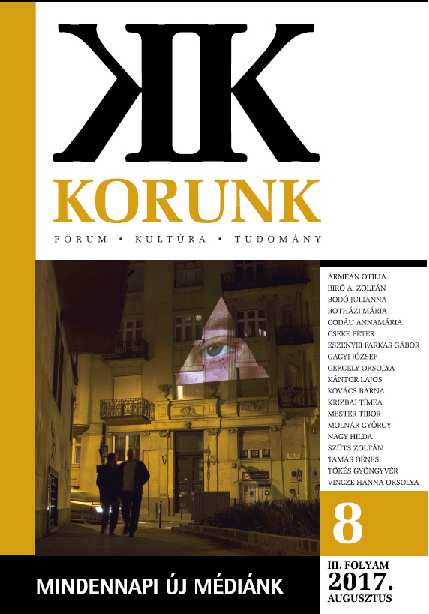
The wider framework of my study is the changing public sphere due to the appearance of the Internet. Commenting is merely one of the possibilities that serve the realization of open public debate. It is questionable, however, how much comments adhere to the rules and norms of debate and dialogue. General experience seems to indicate otherwise. In this study I attempt to find answers as to why public debate is distorted in the publicity opened by commenting.
More...
What are our possibilities for removing our virtual presence from just being there for production of signs and meanings? What are the conditions under which we can benefit from the experience of being fully present in our identity on virtual platforms and stay connected with others? Social media seems to be an opportunity for this, but it happens the exact opposite: we just become a sign for our identity. Communicating our fictional selfs and meanings with others, however, gives a presence to this sign of identity. Meaning effects and presence effects (Gumbrecht) are inseparable from each other. This paper analyses some basic questions and gives a review of literature so further the ways in which media-practices are mapped and the impact of media usage on our identity-constructions, on our relationships with others and on our reflection of the world we live in can be researched in the terms of this project.
More...
Keywords: social media, information technologies, private media, Web 2.0 In this article, the authors claim that in new media the “I” and its private messages are superseded by the messages of professional communicators and traditional media outlets. Numerous (often profane) examples can show that the boundaries of the private sector are pushed forward and the content previously formulated only in private messages is now visible to the entire Internetoften done by “mistake”, as the sender of the message simply lacks knowledge of the technical details and believes to be sharing content with only his or her private friends.
More...

This paper gives a brief account on recent trends related to the production and consumption of television series in Hungary. We argue that watching television is becoming an active practice of gathering experiences in social settings. The notion of “feeling at home” is generally associated with watching the daily soaps and sitcoms in our home, but taking part in online discussion creates another kind of familiarity and sense of belonging. We would highlight new processes of “domestication” of television series using some Hungarian examples. A recent successful trend is “home production”, i.e. the adaptation of an existing series to the Hungarian market. The other type of domestication is achieved by online fan communities that make up for the failures in distribution and overcome the barriers of reception in relation to foreign productions.
More...
Media content created and distributed by users of online interfaces, the active, participatory audience of the latter, participatory culture in general is often hailed as a new, more open form of culture, free of the constraints of traditional mass media. Literature discussing media as a profession or a professionalised institution, i.e. dealing with “old” media, primarily investigates the relationship between “old” and “new” from the point of view of the impact of participatory culture on mass media, the transformation of the latter. At the same time, however, the “private” or “amateur” content created and distributed online often reuses content and forms of knowledge created by mass media or mass cultural industries. The present paper investigates these continuities between “old” and “new” media, the ways in which content and practices created and distributed by traditional media industries are perpetuated in online participatory culture, in the new media practice of private users.
More...

The present study deals with children’s Internet usage at home, which is a relatively new theme in media use research. In my study, I rely on the research experience gained in our project entitled “The impact of the media on children and young people”. The paper seeks to explain the parenting styles related to children’s internet usage habits at home. Parenting styles feature two components: control and warmth. Parenting styles are found in three attitude categories, which are the following: attitude towards control, argumentation of control, and control in practice. Children’s Internet usage at home is a challenge for the local family model, and this is also reflected in the difficulties parents have to face (different Internet usage competences, digital divide, digital immigrant parents, digital native children).
More...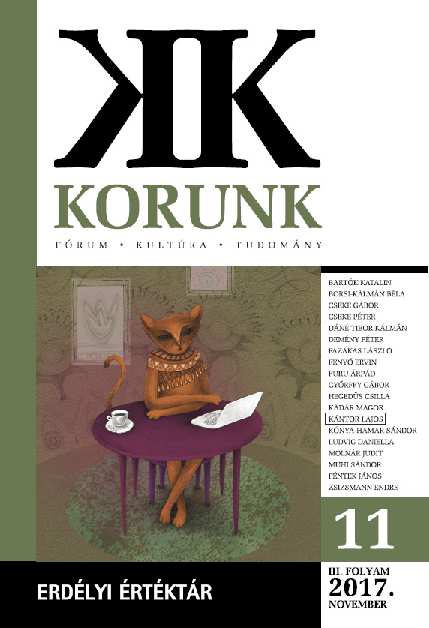
The paper considers the role of a writer-journalist in Russian mass media. The current media space of Russia where a writer-journalist works is analyzed. Their informational and publicistic activity is described. It is suggested that writers as certain subjects of the media reality form a separate group of journalists. This study aims to reveal the functioning specifics of a writer-journalist in the Russian information environment at the turn of the 20th – 21st centuries. In order to fulfill this aim and to solve particular tasks associated with it, including identification of the position of a writer-journalist in the Russian system of public journalism bodies, the creative activity of Zakhar Prilepin (born in 1975), an active and brilliant writer, journalist, social and political activist, is analyzed as an example, as well as some other personalities. An attempt is made to reveal the specifics of perception of the current information and political events taking place in the world by Z. Prilepin, a writer and journalist. The scientific significance of the work is that this is the first time when the writer-journalist is considered as a subject of the media reality at the level of scientific categorial apparatus. The main methods used in the study are analysis and comparison. The conclusion is made that a writer, being an integral person whose consciousness is not influenced by super-new media ideas, is able to impartially reflect the reality, because they can see the difference between truth and lies and consider the reality through the prism of their own world image rather than from the position of here and now. In addition, a writer-journalist is distinguished by complex approaches to the analyzed issue, because they consider it as a problem and not as an event.
More...
This paper characterizes television at the present stage of its development. At the turn of the 20th – 21st centuries, the traditional system of propagation and reception of the television signal has transformed, the previous models of interaction between television and audience changed, and new possibilities of television emerged. The purpose of this paper is to investigate these transformations. The following tasks are set to achieve this purpose: 1) to determine how the processes of digitalization, convergence, as well as other external and internal factors influence the transformation of television, 2) to analyze modern television technologies by identifying the basic characteristics of the functioning of television at the present stage, 3) to consider modern ways of propagation of the television signal, 4) to study the basic reasons why the television content transformed in multimedia; 5) to justify changes in the ways of reception of the television content by audience. The main theoretical techniques used during the study are systemic and holistic ones. Furthermore, the empirical techniques, such as observation and interviews with experts, confirming the obtained conclusions, are applied.
More...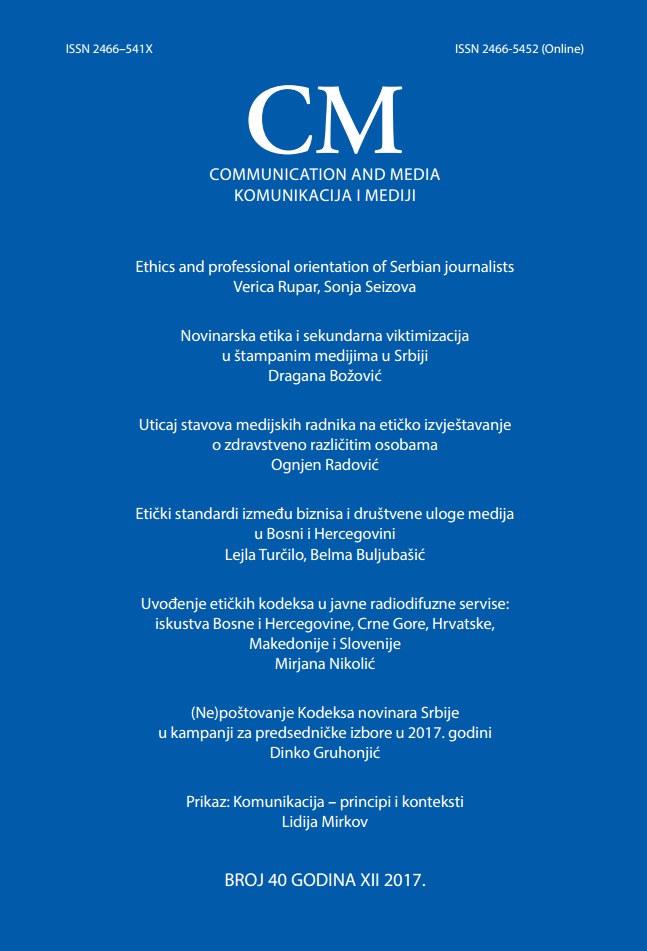
Studies of ethical orientations of journalists, based on large-scale surveys of professional norms and values, generate data that are an important indicator of journalism culture. While it is true that what journalists say they do is not always the same as what they actually do, the discourse about professional roles and ethical standards is a prominent marker of journalistic culture and an element that can be and is usually compared cross-nationally (Hanitzch & Vos, 2016). This study of Serbian journalists follows this stream of scholarship, offering an empirical contribution to the discussion about journalists and their professional orientation. Based on the survey conducted in 2014 as a part of the Worlds of Journalism Study, we first present a socio-demographic profile of Serbian journalists, and then focus on the views on the role of journalists in society, perceived influences on their everyday work and journalists’ perception of ethics. The study approaches journalism as a field of cultural production and adopts the community structure model (Tichenor, Donohue & Olien, 1980) to explore the link between professional orientations of journalists and the demographic characteristics of the community news media are based in. It tests the idea that the perception of the journalist’s role in society might be different in smaller, relatively homogenous towns than in larger, more demographically diverse cities. The study found Serbian journalism culture to be ambiguous, related to the complex set of interactions with political and economic fields, and based on the tension between different models of journalism that have historically influenced the development of the profession in the region, “interventionist” and “monitorial”.
More...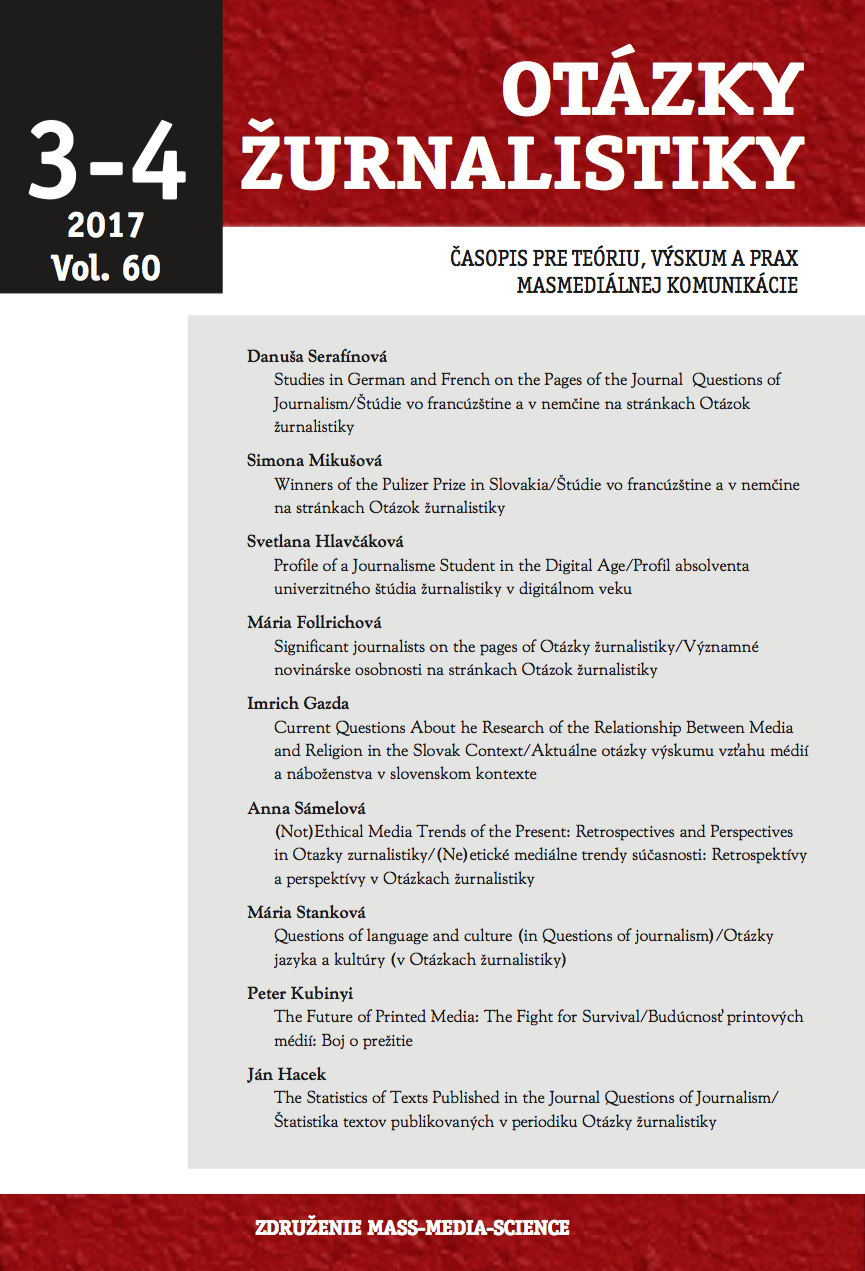
„To leave your journalistic mark on this world, you don’t have to be born into a world of privilege, you don’t have to run for elected office, you don’t have to lead an army, or dedicate yourself to a lifetime of study so you can cure cancer… You just have to have a strong sense of right and wrong, the courage to speak truth to power and an ability to communicate. Everything else can be easily learned,” said Walt Bogdanich. He is a three-time recipient of the Pulitzer Prize who gave an inspirational lecture in Slovakia. Bogdanich is one of seven investigative journalists who visited Slovakia in recent years.
More...
The paper focuses on Otázky žurnalistiky (Questions of journalism) - journal for theory, research and practice of mass media communication registered in the database C.E.E.O.L. (since 2007). In this paper, we examined all editions (N = 11) of mentioned journal from January 2007 to December 2017. We analysed all key words with effort to point at the main issues which the authors wrote about. In this text, we show statistics about articles using and downloading from database C.E.E.O.L. The authors (N = 197) from 22 countries published in Otázky žurnalistiky 425 articles.
More...